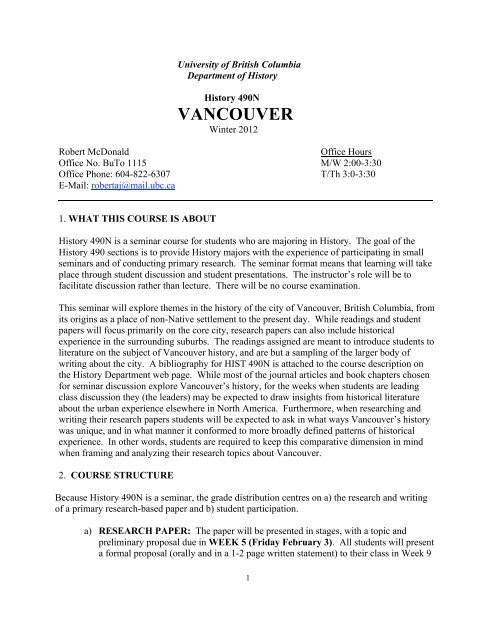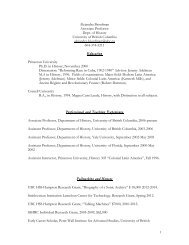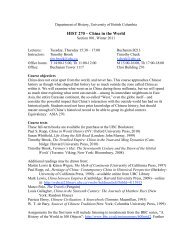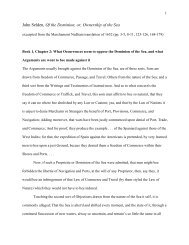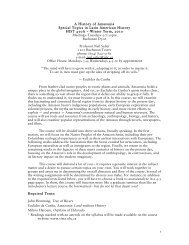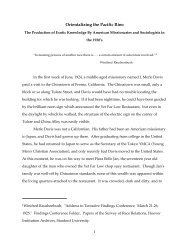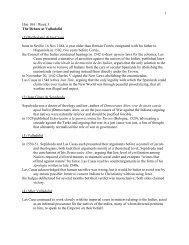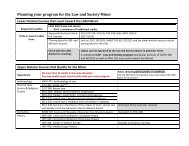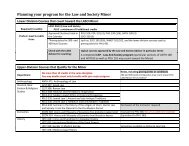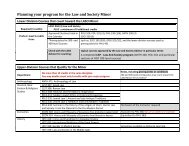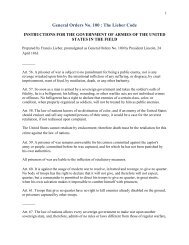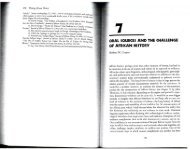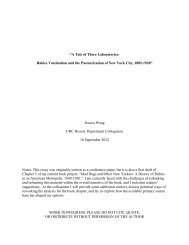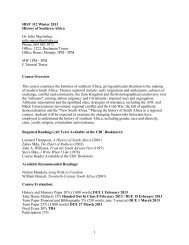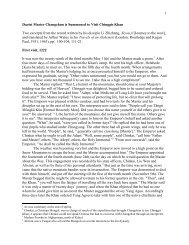VANCOUVER - History, Department of - University of British Columbia
VANCOUVER - History, Department of - University of British Columbia
VANCOUVER - History, Department of - University of British Columbia
Create successful ePaper yourself
Turn your PDF publications into a flip-book with our unique Google optimized e-Paper software.
<strong>University</strong> <strong>of</strong> <strong>British</strong> <strong>Columbia</strong><br />
<strong>Department</strong> <strong>of</strong> <strong>History</strong><br />
<strong>History</strong> 490N<br />
<strong>VANCOUVER</strong><br />
Winter 2012<br />
Robert McDonald<br />
Office Hours<br />
Office No. BuTo 1115 M/W 2:00-3:30<br />
Office Phone: 604-822-6307 T/Th 3:0-3:30<br />
E-Mail: robertaj@mail.ubc.ca<br />
1. WHAT THIS COURSE IS ABOUT<br />
<strong>History</strong> 490N is a seminar course for students who are majoring in <strong>History</strong>. The goal <strong>of</strong> the<br />
<strong>History</strong> 490 sections is to provide <strong>History</strong> majors with the experience <strong>of</strong> participating in small<br />
seminars and <strong>of</strong> conducting primary research. The seminar format means that learning will take<br />
place through student discussion and student presentations. The instructor’s role will be to<br />
facilitate discussion rather than lecture. There will be no course examination.<br />
This seminar will explore themes in the history <strong>of</strong> the city <strong>of</strong> Vancouver, <strong>British</strong> <strong>Columbia</strong>, from<br />
its origins as a place <strong>of</strong> non-Native settlement to the present day. While readings and student<br />
papers will focus primarily on the core city, research papers can also include historical<br />
experience in the surrounding suburbs. The readings assigned are meant to introduce students to<br />
literature on the subject <strong>of</strong> Vancouver history, and are but a sampling <strong>of</strong> the larger body <strong>of</strong><br />
writing about the city. A bibliography for HIST 490N is attached to the course description on<br />
the <strong>History</strong> <strong>Department</strong> web page. While most <strong>of</strong> the journal articles and book chapters chosen<br />
for seminar discussion explore Vancouver’s history, for the weeks when students are leading<br />
class discussion they (the leaders) may be expected to draw insights from historical literature<br />
about the urban experience elsewhere in North America. Furthermore, when researching and<br />
writing their research papers students will be expected to ask in what ways Vancouver’s history<br />
was unique, and in what manner it conformed to more broadly defined patterns <strong>of</strong> historical<br />
experience. In other words, students are required to keep this comparative dimension in mind<br />
when framing and analyzing their research topics about Vancouver.<br />
2. COURSE STRUCTURE<br />
Because <strong>History</strong> 490N is a seminar, the grade distribution centres on a) the research and writing<br />
<strong>of</strong> a primary research-based paper and b) student participation.<br />
a) RESEARCH PAPER: The paper will be presented in stages, with a topic and<br />
preliminary proposal due in WEEK 5 (Friday February 3). All students will present<br />
a formal proposal (orally and in a 1-2 page written statement) to their class in Week 9<br />
1
(February 28/March 1). The first draft <strong>of</strong> papers will be presented in classes from<br />
Weeks 12-14 (starting on Tuesday, March 20 and ending Thursday, April 5). Students<br />
who present their papers in Weeks 12 or 13 will have more time to revise and develop<br />
their papers than others who present at the end <strong>of</strong> the course. The final draft <strong>of</strong> your<br />
research paper should be no longer than 5000 words (about 16 pages, double-spaced,<br />
12-point font) and is due no later than Friday, April 20, 2012. In Weeks 12-14 each<br />
student will also be asked to present a short verbal critique <strong>of</strong> one other student’s<br />
research paper.<br />
b) STUDENT PARTICIPATION: Twenty percent (20%) <strong>of</strong> the course grade will be<br />
given for contribution to in-class discussions in the seminar, with eighty percent (80%)<br />
for other elements. Marks will be distributed as follows:<br />
a) Class participation................................................ 20%<br />
b) Rolf Knight essay………………………………. 5%<br />
b) Essay proposal and bibliography.......................... 10%<br />
c) Seminar readings presentation (written and oral) 10%<br />
d) First draft <strong>of</strong> research paper............................... 15%<br />
e) Critique <strong>of</strong> draft <strong>of</strong> one other student’s paper........ 5%<br />
f) Final Paper............................................................. 35%<br />
Students will be asked to make four presentations in class: 1) for Week 2 everyone<br />
will be asked to make a critical comment on the Major Matthews Collection <strong>of</strong> the<br />
City <strong>of</strong> Vancouver Archives (available online) as an historical source; 2) in Week 5<br />
students will present first a preliminary proposal to me only and then in Week 9 a<br />
formal research paper proposal to their class; other students will have read the<br />
proposal through an e-mail submission and will come to class prepared to ask<br />
questions about the proposed project; 3) for four weeks <strong>of</strong> the course three or four<br />
students per week will lead the discussion based on both the core and supplementary<br />
readings for that week, and will submit a short 4-5 page paper based on the readings;<br />
and 4) in the final classes <strong>of</strong> the year students will present a ten-minute summary <strong>of</strong><br />
the completed first draft <strong>of</strong> their research papers, to be given orally in one <strong>of</strong> the<br />
classes in Weeks 12-14.<br />
3. COURSE MATERIALS<br />
a) Course pack <strong>of</strong> readings in UBC Bookstore<br />
b) Rolf Knight, Along the No.20 Line: Reminiscences <strong>of</strong> the Vancouver Waterfront<br />
(Vancouver: New Star Books, 2011 [ 1980]). Copies in UBC Bookstore.<br />
c) Online sources: articles through the UBC Library; Matthews Collection primary<br />
source through the City <strong>of</strong> Vancouver Archives web page; and Writing Centre on the<br />
web page <strong>of</strong> the UBC <strong>History</strong> <strong>Department</strong>.<br />
4. SEMINAR SCHEDULE<br />
2
Week 1<br />
Jan 3/5<br />
Week 2<br />
Jan. 10/12<br />
INTRODUCTION<br />
BURRARD INLET SOCIETY: SOURCES<br />
A. Required by all……………………………………………………………………….<br />
1. UBC <strong>History</strong> <strong>Department</strong> web page, “Writing Centre,” sections on “Working<br />
with Historical Sources’: a) “Primary Sources”; b) “Secondary Sources”; and<br />
c) “Online Sources.”<br />
2. Robert A.J. McDonald, Making Vancouver: Class, Status, and Social<br />
Boundaries, 1863-1914 (Vancouver: UBC Press, 1996), Chapter 1, “Crowded<br />
between Forest and Shore,” pp. 3-33 and 243-248 [available online through<br />
UBC Library].<br />
3. Jean Barman, The Remarkable Adventures <strong>of</strong> Portugese Joe Silvey (Madeira<br />
Park, BC: Harbour Publishing, 2004), pp.8, 85-86, and 22-37 (course pack).<br />
4. City <strong>of</strong> Vancouver Archives, online source: Major Matthews’ Early<br />
Vancouver.<br />
B. Workshop: This week we want to talk about how sources are used in the writing <strong>of</strong><br />
history. Start by reading through the <strong>History</strong> <strong>Department</strong>’s “Writing Centre”<br />
sections on sources, then read the McDonald and Barman pieces. McDonald’s<br />
chapter is a standard form <strong>of</strong> historical writing based on primary and secondary<br />
sources. Barman’s book on Portugese Joe Silvey is important for its use <strong>of</strong> oral<br />
sources. Now go to the online version <strong>of</strong> Major Matthews’ Early Vancouver. In<br />
one <strong>of</strong> the seven volumes <strong>of</strong> evidence in this collection explore, and be ready to<br />
report to class on, some aspect <strong>of</strong> Burrard Inlet history that is recounted in the<br />
Matthews material and that you think is overlooked or misunderstood by Barman<br />
or McDonald. The point <strong>of</strong> the exercise is to think about the historical value <strong>of</strong> a<br />
primary source such as Matthews’ Early Vancouver.<br />
Week 3<br />
Jan. 17/19<br />
COLONIALISM AND IDENTITY IN EARLY <strong>VANCOUVER</strong><br />
A. Required by all……………………………………………………………………….<br />
1. Jean Barman, “Erasing Indigenous Indigeneity in Vancouver, “BC Studies,<br />
no.155 (Autumn 2007): 3-30 (available online through the UBC Library under<br />
journals OR through the BC Studies web page).<br />
2. Kay J. Anderson, “The Idea <strong>of</strong> Chinatown: The Power <strong>of</strong> Place and Institutional<br />
Practice in the Making <strong>of</strong> a Racial Category,” in Ian McKay, The<br />
Challenge <strong>of</strong> Modernity: A Reader on Post-Confederation Canada (Toronto:<br />
McGraw-Hill, 1992): 156-186 (course pack).<br />
3. Alejandra Yoshizawa and Jennifer Yip, “Vancouver’s Chinatown: Past,<br />
Present, and Future” (2009), Video, available online on You Tube (12 minutes);<br />
also available through the online site UBC Instrcc.<br />
3
B. Additional for Student Presenters.............................................................................<br />
4. Jordan Stanger-Ross, “Municipal Colonialism in Vancouver: City Planning<br />
and the Conflict over Indian Reserves, 1928-1950s,” Canadian Historical<br />
Review, vol.89, no.4 (December 2008): 541-580 (available online through the<br />
UBC Library under journals OR through the CHR web page).<br />
5. Greg Marquis, “Vancouver Vice: The Police and the Negotiation <strong>of</strong> Morality,<br />
1904-1935,” in Hamar Foster and John McLaren, eds., Essays in the <strong>History</strong> <strong>of</strong><br />
Canadian Law, vol.VI, <strong>British</strong> <strong>Columbia</strong> and the Yukon (Toronto: UTP, 1995),<br />
pp.242-273 (course pack).<br />
C. Assignment for Presenters: Write a 4-5 page (double-spaced) essay identifying the<br />
arguments presented in these four readings and reflecting on what they say, collectively,<br />
about the subject <strong>of</strong> racism in early Vancouver history.<br />
Week 4<br />
Jan. 24/26<br />
ROLF KNIGHT’S <strong>VANCOUVER</strong><br />
For this class all students are asked to purchase, read, and write a short paper on the<br />
recently republished book by Vancouver sociologist and writer Rolf Knight, Along the<br />
No.20 Line: Reminiscences <strong>of</strong> the Vancouver Waterfront, which was originally published<br />
in 1980. For your paper, which should not exceed four pages (double-spaced with normal<br />
12-point font), identify and comment critically on the portrait <strong>of</strong> Vancouver that Knight<br />
presents in this book.<br />
Week 5<br />
Jan.31/Feb.2 NO CLASSES: RESEARCH TOPICS PLUS PRELIMINARY<br />
BIBLIOGRAPHY DUE BY FRIDAY, FEBRUARY 3<br />
Week 6<br />
Feb.7/9<br />
NATURE AND THE CITY<br />
A. Required by all…………………………………………………………………………<br />
1. Sean Kheraj, “Restoring Nature: Ecology, Memory, and the Storm <strong>History</strong> <strong>of</strong><br />
Vancouver’s Stanley Park,” Canadian Historical Review, vol.88, no. 4 (December<br />
2007): 577-612 (available online through the UBC Library under<br />
journals OR through the CHR web page).<br />
2. Frank Zelko, “Making Greenpeace: The Development <strong>of</strong> Direct Action<br />
Environmentalism in <strong>British</strong> <strong>Columbia</strong>,” BC Studies, nos.142/143<br />
(Summer/Fall 2004): 197-239 (available online through the UBC Library<br />
under journals OR through the BC Studies web page).<br />
3. Marie-Eve Daunais, “Vancouver’s Street Trees: A Public Affair,” The Atlas:<br />
Undergraduate Journal <strong>of</strong> World <strong>History</strong>, vol.6 (2009): 2-10 (course pack).<br />
B. Additional for Student Presenters…………………………………………………….<br />
4. Arn Keeling, “Sink or Swim: Water Pollution and Environmental Politics in<br />
Vancouver, 1889-1975, “BC Studies, nos.142/143 (Summer/Fall 2004): 69-101<br />
4
(available online through the UBC Library under journals OR through the BC<br />
Studies web page).<br />
5. Joel Tarr, “The Metabolism <strong>of</strong> the Industrial City: The Case <strong>of</strong> Pittsburgh,”<br />
Journal <strong>of</strong> Urban <strong>History</strong>, vol.28, no.5 (July 2002), sections on water and<br />
smoke and Conclusion, pp. 511-532 and 540-541 (available online in the UBC<br />
Library through Sage: Urban Studies and Planning OR through the JUH web<br />
page).<br />
C. Assignment for Presenters: Write a 4-5 page (double-spaced) essay identifying the<br />
arguments presented in these five readings and reflect on how they collectively answer<br />
the question: what is an environmental history <strong>of</strong> cities?<br />
D. Supplementary: Hollow Tree controversy: see www.SaveTheHollowTree.com<br />
Week 7<br />
Feb.14/16<br />
CIVIC POLITICS AND THE “GREAT FREEWAY DEBATE”<br />
A. Required by all…………………………………………………………………………<br />
1. Danielle Robinson, “Modernism at the Crossroads: The Spadina Expressway<br />
Controversy in Toronto, Ontario, ca 1960-1971,” Canadian Historical Review,<br />
vol.92, no. 2 (June 2011): 295-322 (available online through the UBC Library<br />
under journals OR through the CHR web page).<br />
2. Donald Gutstein, Vancouver Ltd. (Toronto: James Lorimer, 1975), pp.151-166<br />
(course pack).<br />
3. V. Setty Pendakur, Cities, Citizens and Freeways (Vancouver: 1972), chapter 5,<br />
pp.75-80 (course pack).<br />
B. Additional for Student Presenters................................................................................:<br />
4. Donald Gutstein, “Vancouver” in Warren Magnusson and Andrew Sancton,<br />
eds., Civic Politics in Canada (Toronto: UTP, 1983), pp.189-221 (course<br />
pack).<br />
5. William Langford, “’Is Sutton Brown God?’ Planning Expertise and the Local<br />
State in Vancouver, 1952-1973,” unpub. M.A. thesis, UBC, 2011, pp.1-54<br />
(source TBA).<br />
C. Assignment for Presenters: Write a 4-5 page (double-spaced) essay identifying the<br />
arguments presented in these five readings and discuss what these readings tell us, and<br />
perhaps what they don’t tell us, about the “Great Freeway Debate” <strong>of</strong> the 1960s and<br />
early 1970s.<br />
D. Supplementary: National Film Board <strong>of</strong> Canada, To Build a Better City (1964),<br />
available online on YouTube [Video].<br />
Week 8<br />
Feb. 21/23<br />
Week 9<br />
Feb.28/1<br />
MID-TERM BREAK<br />
PRESENTATION OF RESEARCH PAPER PROPOSALS<br />
5
Joy Dixon and Jeffrey Alexander, in their Nelson Guide to Writing in <strong>History</strong>, second<br />
edition (2010), write the following about research proposals: “Once you have identified worthwhile<br />
sources and appropriate research questions, it is time to draft a proposal that draws them all<br />
together…here are some general tips on how to approach it. You should begin by outlining your<br />
topic. Describe its importance and discuss your sources, both primary and secondary, in detail.<br />
Summarize the sorts <strong>of</strong> historical debates that authors have been having about the subject. (This<br />
brief discussion <strong>of</strong> the existing secondary sources is known as a literature review). Finally,<br />
introduce and discuss your proposed research questions along with any preliminary conclusions<br />
or expectations that have been drawn. These can later be developed into the central argument, or<br />
thesis, <strong>of</strong> your essay. Of course, your final conclusions may contrast sharply with your initial<br />
expectations. This is one <strong>of</strong> the things that characterizes good research. Just as a police <strong>of</strong>ficer<br />
investigating a crime may have to change hypotheses as she or he uncovers new evidence, you<br />
should also be prepared to discover unexpected and interesting results as you proceed with your<br />
research.” (pp.34-35)<br />
Week 10<br />
Mar.6/8<br />
<strong>VANCOUVER</strong> AND GLOBALIZATION<br />
A. Required by all…………………………………………………………………………<br />
1. Katharyne Mitchell, Crossing the Neoliberal Line: Pacific Rim Migration and<br />
the Metropolis (Philadelphia: Temple <strong>University</strong> Press, 2004), chap. 2,<br />
“Vancouver Goes Global,” pp.40-86 and 227-234 (course pack)<br />
2. Daniel Hiebert, “Immigration and the Changing Social Geography <strong>of</strong> Greater<br />
Vancouver,” BC Studies, no.121 (Spring 1999): 35-82 (available online<br />
through the UBC Library under journals OR through the BC Studies web<br />
page).<br />
3. Charles Montgomery, “Futureville,” Canadian Geographic, May/June 2006:<br />
44- 60 (available online in UBC Library through Academic Search).<br />
Complete).<br />
B. Additional for Student Presenters.................................................................................<br />
4. David Ley, “Between Europe and Asia: The Case <strong>of</strong> the Missing Sequoias,”<br />
Ecumene, vol.2, no.2 (1995): 185-210 (course pack).<br />
5. Laura Madokoro, “Chinatown and Monster Homes: The Splintered Diaspora<br />
in Vancouver,” Urban <strong>History</strong> Review, vol.39, no.2 (2011): 17-24 (available<br />
online through the UBC Library under journals OR through the Urban<br />
<strong>History</strong> Review web page).<br />
C Assignment for Presenters: Write a 4-5 page (double-spaced) essay identifying the<br />
arguments presented in these five readings and discuss how you would evaluate the<br />
insights to be drawn from these readings about the impact <strong>of</strong> globalization on<br />
Vancouver.<br />
.<br />
Week 11( Mar. 13/15) RESEARCH WEEK: NO CLASSES<br />
6
Week 12<br />
Mar. 20/22<br />
Week 13<br />
Mar. 27/29<br />
Week 14<br />
April 3/5<br />
FIRST DRAFT PAPER PRESENTATIONS TO CLASS<br />
FIRST DRAFT PAPER PRESENTATIONS TO CLASS<br />
FIRST DRAFT PAPER PRESENTATIONS TO CLASS<br />
5. RESEARCH PAPERS due: Friday, 20 April 2012<br />
6. POSSIBLE ESSAY TOPICS: This assignment is open to a wide range <strong>of</strong> potential subjects<br />
about Vancouver’s past. The following are a number <strong>of</strong> topic ideas that you may want to<br />
consider. You are also encouraged to identify alternatives. One cautionary note must be<br />
considered when defining a topic, however. Research papers must address historical problems in<br />
an analytical manner and must employ primary sources that are readily available to UBC<br />
students. For these reasons some potential ideas may not be feasible. Your preliminary work in<br />
early September, then, must (i) not only identify a good idea but (ii) also determine if the idea is<br />
practical. All topic suggestions should receive my approval before you proceed past the<br />
preliminary stage <strong>of</strong> your research.<br />
1) Urban recreation: Vancouver’s north shore<br />
2) Housing: “Vancouver Specials”<br />
3) Debate about building heights in Vancouver<br />
4) Public housing (Raymur / Little Mountain)<br />
5) Neighbourhood studies in the interwar years: Mt. Pleasant / Dunbar / West Vancouver<br />
6) The evolution <strong>of</strong> a street: Hastings Street from Cambie to Main, 1940-1980.<br />
7) Racism and South Asians in Vancouver, the 1980s<br />
8) Police corruption: 1950s<br />
9) D.E.R.A versus City Council, 1970s<br />
10) Blacks in Vancouver, 1920s-1960s<br />
11) Pollution and Fairview Slopes OR False Creek and air pollution, 1920s to 1960s<br />
12) The Federal Government and Vancouver’s waterfront in the Second World War<br />
13) “Urban Indians”: Non-Native response to First Nations residents, 1960s-70s.<br />
14) Vancouver’s response to the unemployed, 1919–1922.<br />
15) Working class suburb: South Vancouver, 1908-1930s<br />
16) From “Skid Road” to the “Downtown Eastside,” 1940s-1970s.<br />
17) Social anxiety about “Juvenile Delinquents” (from the late 1930s to the 1960s, or some<br />
portion there<strong>of</strong>) [see BC Newspaper Index for “Juvenile Delinquents”].<br />
18) Stanley Park and tourism: 1920s to 1950s.<br />
19) Changing Perceptions <strong>of</strong> Vancouver’s Chinatown, 1940s-1980s<br />
20) The Barbequed Meats Controversy in Vancouver’s Chinatown in the 1970s<br />
21) Yip Sang: Vancouver businessman<br />
22) Member <strong>of</strong> Parliament Douglas Jung, MP, 1957-62<br />
7
23) Helena Gutteridge and Civic Politics in the 1930s<br />
24) Explosion <strong>of</strong> the S.S. Greenhill Park, Port <strong>of</strong> Vancouver, 1945<br />
25) Mayor William Rathie and the Politics <strong>of</strong> Development in Vancouver in the 1960s<br />
26) Vancouver’s Downtown Eastside and Expo ‘86<br />
27) Vancouver’s General Strike, 1919<br />
28) Riots in 1930s Vancouver<br />
29) The Gastown Riot, August 1971<br />
30) Vancouver’s International (Arts) Festival <strong>of</strong> 1958: Significant?<br />
7. SOURCES: ORAL HISTORY<br />
The sources that we are using in this course are mainly textual. One other types <strong>of</strong> source, oral<br />
history, also <strong>of</strong>fers potentially fruitful ways to understand past experience in Vancouver. The<br />
value <strong>of</strong> oral history is that it can generate insights about the lives <strong>of</strong> ordinary people that are<br />
difficult to find in textual sources such as government documents or newspapers. A good<br />
introduction to the use <strong>of</strong> interviews for research in family history can be found in through the<br />
UBC Instrcc website. Look for the online piece by Alejandra Yoshizawa, “Listen and Learn:<br />
Oral <strong>History</strong> at the <strong>University</strong> <strong>of</strong> <strong>British</strong> <strong>Columbia</strong>.”<br />
8. SOURCES: NEWSPAPERS<br />
Good collections <strong>of</strong> <strong>British</strong> <strong>Columbia</strong> newspapers are available on micr<strong>of</strong>ilm on the second floor<br />
level <strong>of</strong> the Koerner Library and in the Central Branch <strong>of</strong> the Vancouver Public Library. A<br />
complete list <strong>of</strong> UBC’s holdings can be found in a file in the Koerner Library’s Reference<br />
Division. The best sources for newspaper holding are:<br />
1. Hana Komorous, comp. Union Catalogue <strong>of</strong> <strong>British</strong> <strong>Columbia</strong> Newspapers, 3 vols.<br />
(Vancouver, 1987) [ZPN 4917 B72 K65 1987].<br />
OR<br />
2. UBC Library’s On-line Catalogue <strong>of</strong> <strong>British</strong> <strong>Columbia</strong> newspapers [start with file<br />
system UBC Library, then Electronic Resources, and then BC Newspapers].<br />
9. SOURCES: NEWSPAPER INDEXES<br />
You should know about two important B.C. newspapers indexes. Both are on the second floor<br />
<strong>of</strong> the Koerner Library: the first (BC Newspaper Index) is in the micr<strong>of</strong>ilm section on floor 2<br />
(Catalogue No. R. 5065); the second (Colonist Index) a micr<strong>of</strong>iche and is located at the back <strong>of</strong><br />
the micr<strong>of</strong>ilm section.<br />
(a) B.C. Legislative Library. BC Newspaper Index, 1800–1970 [gap 1910–1915 and<br />
spotty coverage to 1930], 1971–80, 1981– (May 1983). Only Vancouver and Victoria<br />
newspapers, but different papers at different times. [Micr<strong>of</strong>ilm R5065]. The gap in the<br />
BC Newspaper Index for Victoria and Vancouver papers after 1910 has been filled<br />
through 1917 by a comprehensive indexing project conducted by the <strong>British</strong> <strong>Columbia</strong><br />
Provincial Library. The new index has not been micr<strong>of</strong>ilmed and is available only in the<br />
Provincial Library in Victoria; access is restricted when the legislature is in session.<br />
8
(b) An index to the New Westminster <strong>Columbia</strong>n is available at the New<br />
Westminster library, and newspaper clipping files are available at the City <strong>of</strong><br />
Vancouver Archives and at the Provincial Archives (in the Vertical File,on micr<strong>of</strong>iche).<br />
10. ARCHIVES IN THE GREATER <strong>VANCOUVER</strong> AREA: The finding aids <strong>of</strong> the<br />
archives located in and around Vancouver can be accessed by searching on Google for<br />
“The <strong>British</strong> <strong>Columbia</strong> <strong>History</strong> Internet/Web Site”. At UBC there are two separate<br />
archives: 1) UBC Rare Books and Special Collections, which holds the Chung<br />
Collection; and 2) UBC <strong>University</strong> Archives. Both have their own web pages and both<br />
are physically located in the lower area <strong>of</strong> the Barber Library. Many other archives,<br />
including the City <strong>of</strong> Vancouver Archives, also have their own web pages. These various<br />
archives include:<br />
1. UBC Rare Books and Special Collections, which includes the Chung Collection<br />
2. UBC <strong>University</strong> Archives<br />
3. City <strong>of</strong> Vancouver Archives<br />
4. City <strong>of</strong> Burnaby Archives<br />
5. City <strong>of</strong> Richmond Archives<br />
6. Japanese Canadian National Museum (Burnaby)<br />
7. Langley Centennial Museum<br />
8. Matsqui-Sumas-Abbotsford Archives<br />
9. Mennonite Historical Society (Abbotsford)<br />
10. Mission Community Archives<br />
11. New Westminster Museum and Archives<br />
12. North Vancouver Museum and Archives<br />
13. Delta Museum and Archives<br />
14. SFU Archives<br />
15. Union <strong>of</strong> BC Indian Chiefs (Vancouver) manages a Resource Centre which includes a<br />
searchable database to <strong>Department</strong> <strong>of</strong> Indian Affairs records (RG-10) and the National<br />
Archives <strong>of</strong> Canada<br />
9


